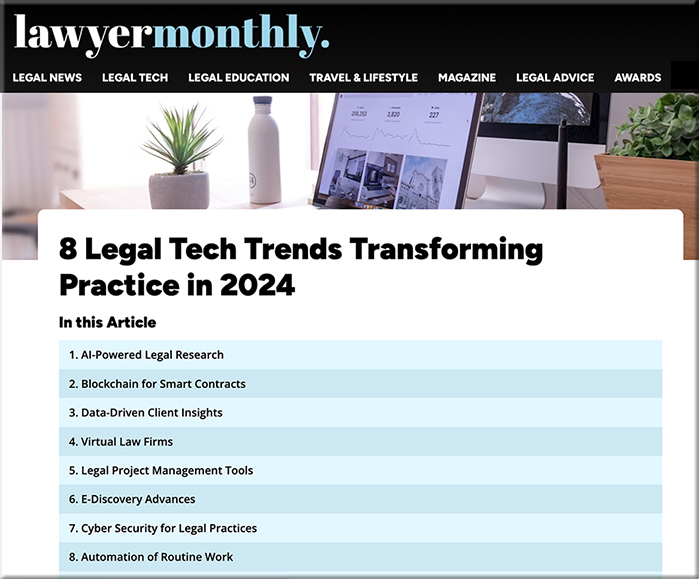ILTACON 2024: Selling legal tech’s monorail — from abajournal.com by Nicole Black
The bottom line: The promise of GenAI for our profession is great, but all signs point to the realization of its potential being six months out or more. So the question remains: Will generative AI change the legal landscape, ushering in an era of frictionless, seamless legal work? Or have we reached the pinnacle of its development, left only with empty promises? I think it’s the former since there is so much potential, and many companies are investing significantly in AI development, but only time will tell.
From LegalZoom to AI-Powered Platforms: The Rise of Smart Legal Services — from tmcnet.com by Artem Vialykh
In today’s digital age, almost every industry is undergoing a transformation driven by technological innovation, and the legal field is no exception. Traditional legal services, often characterized by high fees, time-consuming processes, and complex paperwork, are increasingly being challenged by more accessible, efficient, and cost-effective alternatives.
LegalZoom, one of the pioneers in offering online legal services, revolutionized the way individuals and small businesses accessed legal assistance. However, with the advent of artificial intelligence (AI) and smart technologies, we are witnessing the rise of even more sophisticated platforms that are poised to reshape the legal landscape further.
The Rise of AI-Powered Legal Platforms
AI-powered legal platforms represent the next frontier in legal services. These platforms leverage the power of artificial intelligence, machine learning, and natural language processing to provide legal services that are not only more efficient but also more accurate and tailored to the needs of the user.
AI-powered platforms offer many advantages, with one of them being their ability to rapidly process and analyze large amounts of data quickly. This capability allows them to provide users with precise legal advice and document generation in a fraction of the time it would take a human attorney. For example, AI-driven platforms can review and analyze contracts, identify potential legal risks, and even suggest revisions, all in real-time. This level of automation significantly reduces the time and cost associated with traditional legal services.
AI, Market Dynamics, and the Future of Legal Services with Harbor’s Zena Applebaum — from geeklawblog.com by Greg Lambert
Zena talks about the integration of generative AI (Gen AI) into legal research tools, particularly at Thomson Reuters, where she previously worked. She emphasizes the challenges in managing expectations around AI’s capabilities while ensuring that the products deliver on their promises. The legal industry has high expectations for AI to simplify the time-consuming and complex nature of legal research. However, Applebaum highlights the need for balance, as legal research remains inherently challenging, and overpromising on AI’s potential could lead to dissatisfaction among users.
Zena shares her outlook on the future of the legal industry, particularly the growing sophistication of in-house legal departments and the increasing competition for legal talent. She predicts that as AI continues to enhance efficiency and drive changes in the industry, the demand for skilled legal professionals will rise. Law firms will need to adapt to these shifts by embracing new technologies and rethinking their strategies to remain competitive in a rapidly evolving market.
Future of the Delivery of Legal Services — from americanbar.org
The legal profession is in the midst of unprecedented change. Learn what might be next for the industry and your bar.
What. Just. Happened? (Post-ILTACon Emails Week of 08-19-2024) — from geeklawblog.com by Greg Lambert
Here’s this week’s edition of What. Just. Happened? Remember, you can track these daily with the AI Lawyer Talking Tech podcast (Spotify or Apple) which covers legal tech news and summarizes stories.

From DSC:
And although this next one is not necessarily legaltech-related, I wanted to include it here anyway — as I’m always looking to reduce the costs of obtaining a degree.
Improve the Diversity of the Profession By Addressing the Costs of Becoming a Lawyer — from lssse.indiana.edu by Joan Howarth
Not surprisingly, then, research shows that economic assets are a significant factor in bar passage. And LSSSE research shows us the connections between the excessive expense of becoming a lawyer and the persistent racial and ethnic disparities in bar passage rate.
The racial and ethnic bar passage disparities are extreme. For example, the national ABA statistics for first time passers in 2023-24 show White candidates passing at 83%, compared to Black candidates (57%) with Asians and Hispanics in the middle (75% and 69%, respectively).
These disturbing figures are very related to the expense of becoming a lawyer.
Finally, though, after decades of stability — or stagnation — in attorney licensing, change is here. And some of the changes, such as the new pathway to licensure in Oregon based on supervised practice instead of a traditional bar exam, or the Nevada Plan in which most of the requirements can be satisfied during law school, should significantly decrease the costs of licensure and add flexibility for candidates with responsibilities beyond studying for a bar exam. These reforms are long overdue.
Thomson Reuters acquires Safe Sign Technologies — from legaltechnology.com by Caroline Hill
Thomson Reuters today (21 August) announced it has acquired Safe Sign Technologies (SST), a UK-based startup that is developing legal-specific large language models (LLMs) and as of just eight months ago was operating in stealth mode.












